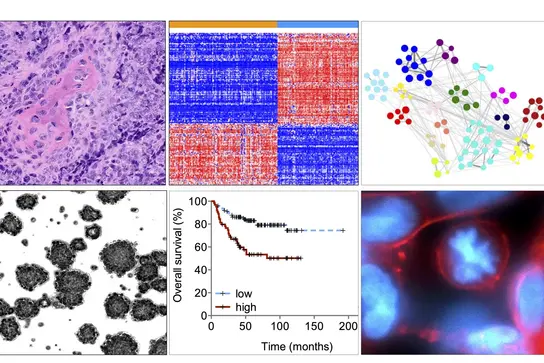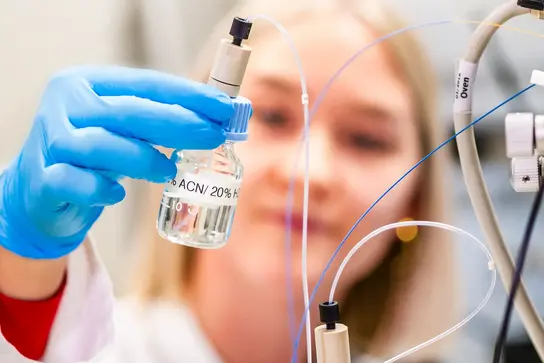Translational Pediatric Sarcoma Research
- Functional and Structural Genomics
- KiTZ

Prof. Dr. Dr. Thomas Grünewald
Head of Division
The mission of the division of Translational Pediatric Sarcomas Research is the to improve treatment options for children, adolescents and young adults affected by sarcomas.

Our mission

We aim at uncovering disease mechanisms that can be used diagnostically and therapeutically to improve the long-term chances of recovery of our young patients. The focus lies on new methods that are essential for correct diagnosis and the choice of the best possible therapy. We also investigate less aggressive therapies and new approaches to overcome drug resistance of tumors.
Our Research areas

To accomplish our mission, the division Translational Pediatric Sarcoma Research is comprised of three teams whose collaboration gives way to synergetic effects:
The team Translational Genomics (Prof. Dr. Dr. T. Grünewald & Dr. Dr. Dr. Jing Li) systematically establishes multi-dimensional omics-datasets of a large number of pediatric sarcomas and correlates molecular alterations with clinical data to identify new driver mutations, disease-relevant drug targets and prognostic/predictive biomarkers, and to create resources for hypothesis generation and functional validation for future projects.
The team Mechanisms of Cancer Progression (Dr. F. Cidre-Aranaz) aims at deconvoluting the multilayered process underlying cancer progression and metastasis. For this purpose, systems biology approaches based on multi-omics data and clinical information with functional in vitro and in vivo experiments will be combined to identify treatable vulnerabilities in pediatric sarcomas that can prevent metastasis.
The team Innovative Therapies (Dr. S. Ohmura) is investigating potential therapeutic targets for pediatric sarcomas in preclinical models. The focus here lies in developing and testing new targeted therapy approaches, including immunotherapy, that enable more effective therapy with fewer side effects, especially for patients with chemo resistant tumors.
Our division
- Show profile

Prof. Dr. Dr. Thomas Grünewald
Head of Division
- Show profile

Richard Arndt
Doctoral Student
- Show profile

Martha Carreno Gonzalez
Doctoral Student
- Show profile

Kalina Chavdarova
Doctoral Student
- Show profile

Dr. Florencia Cidre Aranaz
Deputy Head of Division and Team Leader
- Show profile

Anna Ehlers
Doctoral Student
- Show profile

Rafat Esso
Doctoral Student
- Show profile

Tobias Faehling
Doctoral Student
-
Linus Fischer
- Show profile

Florian Geyer
Doctoral Student
- Show profile

Nadine Gmelin
Research Technician
- Show profile

Nina Hahnen
Doctoral Student
- Show profile

Maite Hannemann
Team assistant
- Show profile

Dr. Kimberley Hanssen
Post-Doc
- Show profile

Dr. Clémence Henon
Post-Doc
- Show profile

Annika Jeschke
Doctoral Student
- Show profile

Maxim Kafka
Doctoral Student
- Show profile

Sabrina Knoth
Technical Assistant
- Show profile

Dr. Maximilian Knott
Post-Doc
- Show profile

Stefanie Kutschmann
Technical Assistant
- Show profile

J-Ann Lego
Doctoral student
- Show profile

Dr. Jing Li
Co-Team Leader
- Show profile

Lovro Marjanovic
Doctoral student
- Show profile

Dr. Julian Musa
Scientific staff
- Show profile

David Friedrich Obermeier
Doctoral student
- Show profile

Dr. Shunya Ohmura
Team Leader
- Show profile

Carla Panisello Aranda
Doctoral student
-

Dr. Eleonora Prodi
Staff scientist
- Show profile

Alina Ritter
Doctoral student
-
Dr. Laura Romero Pérez
- Show profile
Melissa Schmucker
Doctoral student
- Show profile
Marleen Trapp
Technical Assistant
-
Timo Trinczek
-
Pablo Táboas Outón
- Show profile

David Wolfhard
Master thesis student
- Show profile

Angelina Yershova
Doctoral student
- Show profile

Felina Zahnow
Technical Assistant
- Show profile

Malenka Zimmermann
Doctoral student
Selected Publications
Kasan M, Geyer FH, Siebenlist J, Sill M, Öllinger R, Faehling T, de Álava E, Surdez D, Dirksen U, Oehme I, Scotlandi K, Delattre O, Müller-Nurasyid M, Rad R, Strauch K, Grünewald TGP, Cidre-Aranaz F.
Therapeutic targeting of the PLK1-PRC1-axis triggers cell death in genomically silent childhood cancer
Li J, Ohmura S, Marchetto A, Orth MF, Imle R, Dallmayer M, Musa J, Knott MML, Hölting TLB, Stein S, Funk CM, Sastre A, Alonso J, Bestvater F, Kasan M, Romero-Pérez L, Hartmann W, Ranft A, Banito A, Dirksen U, Kirchner T, Cidre-Aranaz F, Grünewald TGP
Oncogenic hijacking of a developmental transcription factor evokes vulnerability toward oxidative stress in Ewing sarcoma
Marchetto A, Ohmura S, Orth MF, Knott MML, Colombo MV, Arrigoni C, Bardinet V, Saucier D, Wehweck FS, Li J, Stein S, Gerke JS, Baldauf MC, Musa J, Dallmayer M, Romero-Pérez L, Hölting TLB, Amatruda JF, Cossarizza A, Henssen AG, Kircher T,Moretti M, Cidre-Aranaz F, Sannino G, Grünewald TGP
Cooperation of cancer drivers with germline regulatory variants shapes clinical outcomes
Musa J, Cidre-Aranaz F, Aynaud MM, Orth MF, Knott MML, Mirabeau M, Mazor G, Varon M, Hölting TLB, Grossetête S, Gartlgruber M, Surdez D, Gerke JS, Ohmura S, Marchetto A, Dallmayer M, Baldauf MC, Stein S, Sannino G, Li J, Romero-Pérez L, Westermann F, Hartmann W, Dirksen U, Gymrek M, Anderson ND, Shlien A, Rotblat B, Kirchner T, Delattre O, Grünewald TG
Additional Project Funding
Directions
This is our address:
German Cancer Research Center (DKFZ)
Division of Translational Pediatric Sarcoma Research / B410
Im Neuenheimer Feld 280
69120 Heidelberg
Germany
We are located in the main building on the 6th floor:
Room 075 - Prof. Dr. Dr. Thomas Grünewald
Room 074 - Team leaders: Dr. Florencia Cidre-Aranz / Dr. Shunya Ohmura / Dr. Jing Li
Roomm 01.06.070 - Team assistant: Maite Hannemann
Room 058, 061-069 - Laboratory
For further information how to find us, please follow this link.
Get in touch with us

